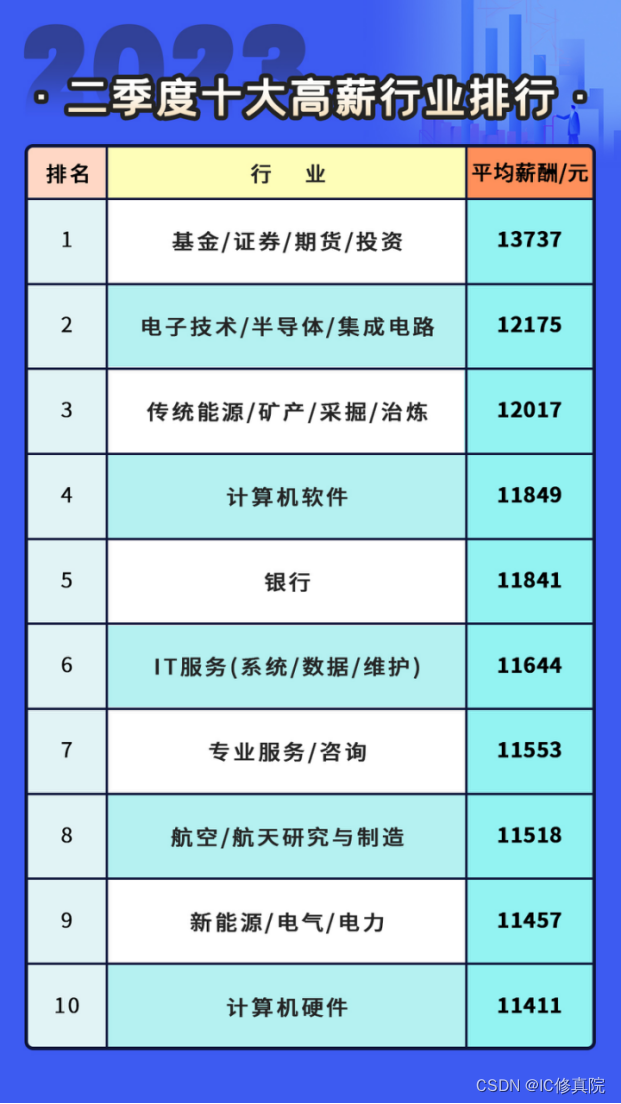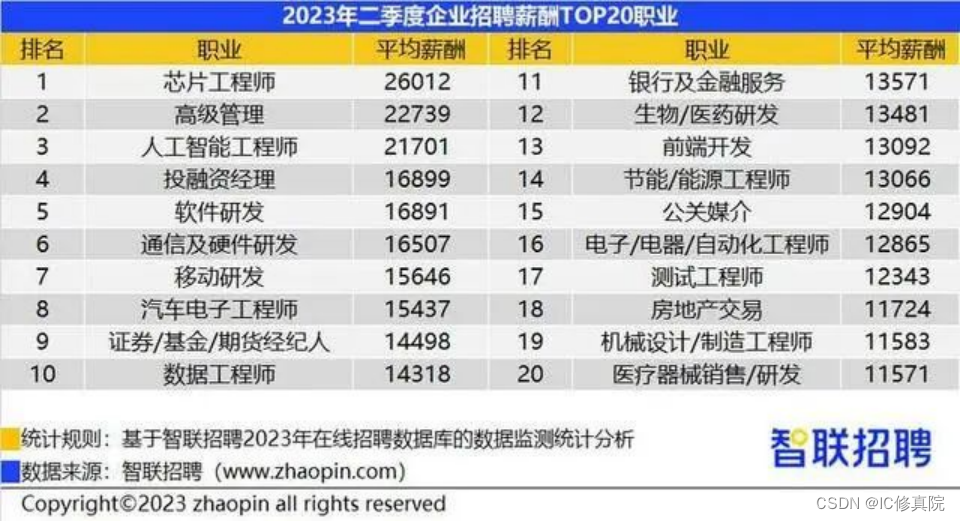I saw a student asking on a certain platform, which one is better, computer or electronic information? The employment salaries of these two majors are relatively high, so everyone is confused. Below, IC Cultivation Academy will give you a detailed analysis from the perspective of professional direction, salary, and employment.
What is the difference between these two majors?
Computer major
It mainly focuses on computer science, computer engineering and other directions, including computer principles, programming languages, algorithms and data structures, operating systems, databases and other courses.
Electronic Information Major
The electronic information major pays more attention to the study of electronic technology, communication technology and other fields, mainly including circuit principles, signal processing, communication principles, microelectronics technology and other courses. Both majors have their own advantages. Which one is better depends on your personal interests and career plans.
High technologies such as Beidou, 5G signals, and chips that we are familiar with all belong to the research and development category of electronic information.
From the perspective of learning content:
Both types of majors involve software and hardware, but most of the computer majors are in the software direction, that is, programming, writing code, and doing data. The requirements for disciplines are not high, and the requirements for equipment are not too high. You can learn it if you have a computer.
Most of the electronic information majors are in the hardware direction, that is, the study of signal processing, integrated circuits, electronic components, chips, etc., and have high requirements for mathematics and physics (in other words, if you do not have good grades in physics, it will be difficult to learn) ), at the same time, many things cannot be done without professional equipment.
The two majors have different training directions
Electronic information engineering is a discipline that applies computer and other modern technologies to electronic information control and information processing. It mainly studies the acquisition and processing of information, and the design, development, application and integration of electronic equipment and information systems.
Computer science is a wide-caliber major that combines hardware and software, is system-oriented, and focuses on applications. It mainly cultivates senior talents with solid foundation, broad knowledge and strong engineering practical ability, who are engaged in scientific research, education, development and application in the field of computer science and technology.
Regarding the degree of difficulty of the major, computers have certain requirements for mathematics, but those with average mathematics scores can also learn it with computer majors. Electronic information depends on both your score in the physics and electricity section and your mathematical foundation, so electronic information The cross-fertilization of information is particularly strong and the difficulty will be even greater.
Comparison of employment directions
After graduating from microelectronics, you can work as a hardware engineer, specializing in integrated circuit design and development, device manufacturing and technology. Especially in some large companies famous for technological innovation, the salary is quite good.
Internationally, Intel, Texas Instruments, Qualcomm, STMicroelectronics (ST), Applied Materials, ASML, and Tokyo Electronics are all relatively large integrated circuit and chip manufacturing companies; domestically, such as Spreadtrum, HiSilicon, and Datang Microelectronics , Vitex Microelectronics and other companies. The occupations corresponding to this major mainly include microcontroller development engineers, FPGA development engineers, electronic engineers, software engineers, PCBlayout engineers, assistant engineers, maintenance engineers, test engineers, technicians, etc.
From an employment perspective, computer talents can serve as computer professional system application development or management in various enterprises and institutions. Common positions include software development engineers, network security engineers, embedded technical support engineers, computer system analysts, etc. .
Intensity of work
The IT
Internet industry is developing rapidly and the competition is fierce. In order to cater to the market, product updates and iterations are relatively fast. By working overtime and racing against time, they win market opportunities. No matter how agile the development is, the project must be rushed online, and "996" all night is common. Internet companies' performance appraisal methods are also relatively strict, and year-end bonus appraisals are somewhat related to overtime factors.
IC
chip design is too expensive to tape out, resulting in a very long development cycle. A project, from front-end to back-end, often requires a long time to prepare. It may take one to two years to complete a tape-out. Such a long cycle makes the work rhythm of IC design engineers not so fast. Overtime work in the IC industry is intermittent, and different positions have different busyness levels at different stages.
Salary


From an occupational perspective, chip engineers continue to be at the top of the list of high-paying occupations. The average monthly recruitment salary in the second quarter was 26,012 yuan, an increase of 1.6% from the previous quarter's 25,599 yuan. The recruitment salary of artificial intelligence engineers also exceeds 20,000 yuan, ranking third.
Although the salary of technical positions such as software R&D, hardware R&D, mobile R&D and data engineers has dropped from last year, they are still high-paying occupations.
No matter which industry you choose, before entering the industry, you must understand the current employment in the industry, whether you are interested in what you want to learn, and consider the future development of the industry and whether your current situation can meet the entry threshold. You can also find a job first Engineers in the industry need to do some understanding first.
Here’s a quick introduction: Introduction to IC